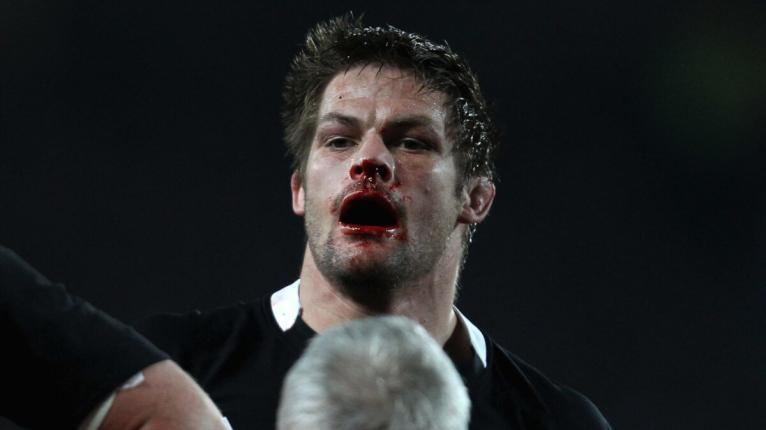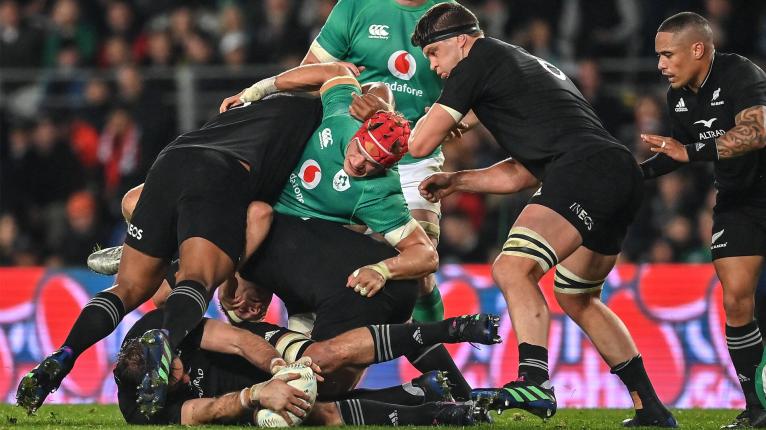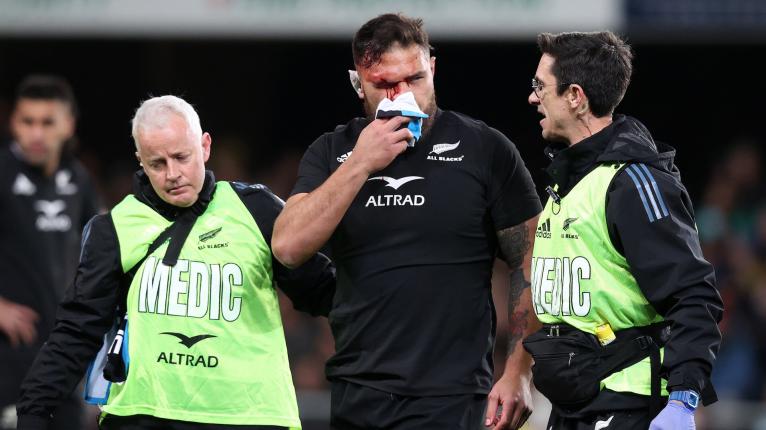It’s quite the legacy former All Blacks captain Richie McCaw has left. Not the official one – not his 15 years of impeccable and brilliant service to leave the game internationally recognised as the greatest in history.
We are talking here about his unofficial legacy, the problems his greatness may now be causing the current generation of All Blacks.
The problem with McCaw was that he defied belief in the way he could so brilliantly impose himself on every test he played between 2001 and 2015. He had such an in-depth knowledge of the rules that he could exploit loopholes with lightning speed and bravery and for the entirety of his career he fielded accusations about the legality of much of his work.
He was the tall poppy the rest of the world was desperate to cut down and they tried to do so by hacking away at his (and, by extension, the All Blacks’) reputation.
For 15 years McCaw was told he was a cheat. A brilliant cheat, but still a cheat. He was also subjected to the most intense physical assaults at times as players from all over the world tried to quite literally take his head off such was their frustration with the All Blacks captain’s insane ability to get over the ball and steal it.

Everyone lost count of the number of times he was recklessly taken out, but the more memorable acts of egregious violence were committed by Scott Higginbotham, Dylan Hartley, Andy Powell, Dean Greyling and Aurelien Rougerie who frankly lost the plot in the last minute of the 2011 World Cup final and appeared to administer, in quick succession, a flying head-butt followed by an eye-gouge.
McCaw became, outside of New Zealand at least, public enemy number one, jeered and booed almost everywhere he went.
“Well, it’s normal over here,” remarked former All Blacks coach Steve Hansen when McCaw was booed in the first game of the 2015 World Cup in England. “It’s been happening for years,” he said, with a wry smile.
“We’ll take it for what it is, a mark of respect against a great player. You don’t get booed unless you’re any good. If you’re no good, no one cares.”
Hansen and McCaw shrugged off the verbal and physical assaults and never deviated from the straight bat approach of treating it all as a mark of respect.
But there was a secondary element to all this which was that is that this era saw a widespread belief take hold that the All Blacks were the beneficiaries of favourable refereeing.
That preconceived idea that this team will beat this team, that’s gone. Now any team can beat any team.
Rassie Erasmus ahead of South Africa’s match with NZ at the Rugby World Cup in 2019
McCaw would be blasted a cheat and then opponents would often double down and say the All Blacks as a whole, got away with murder: that they had some kind of ability to influence referees wherever they went.
The narrative built the more the All Blacks were successful and reached its zenith at the 2019 World Cup, when ahead of the pool clash with South Africa, Springboks coach Rassie Erasmus, said: “I think it was a well-known fact that it was really tough times and teams were under the pump, some of the 50-50 decisions went their way because they deserved that being number one so long.
“That preconceived idea that this team will beat this team, that’s gone. Now any team can beat any team.”
But while Erasmus may have been the most opaque and direct in his public assessment, this idea of undermining the All Blacks publicly, to cast them as a dark and devious force continues to this day.
Ireland were certainly guilty of creating an unfavourable impression of the All Blacks after the first test clash of this series.
Having been beaten 42-19 at Eden Park, Ireland coach Andy Farrell made some oblique references to being unhappy about what was happening at the scrum and he also said this: “The interpretation of the breakdown, we need some answers as far as that is concerned so we can put our own stuff right.
“There were a few things going in that we will need to get clarified. There is a depth to a ruck and an entry to a ruck that we need confirming – let’s say it that way. Then once that is confirmed we will get our own house in order.”

A few days after the test, Ireland supposedly received feedback from World Rugby that the All Blacks should have been shown two yellow cards but weren’t.
A review of the game by the governing body’s referee boss, Joel Jutge, allegedly concluded that Rieko Ioane should have been carded for a high tackle on Joey Carberry – an act that should also have led to Ireland being awarded a penalty try – and that Scott Barrett should have been sin-binned for a no arms cleanout late in the game on Peter O’Mahony.
Ireland’s first penalty in the second test in Dunedin was given against Dalton Papalii, whom referee Jaco Peyper said had taken a player out past the ruck.
Then of course, three cards would be shown in the first 30 minutes – one of which was indisputable – but the other two, on another day ruled by another group of officials, could have been written off as accidental collisions.
The All Blacks were victims of their own confusion and inaccuracies and Ireland’s well-considered and smartly executed game-plan, but they were also, to some extent, victims of a narrative that clearly took hold in the aftermath of their opening 42-19 victory.
All those years of lobbying by opponents has maybe painted a picture about the All Blacks that is proving hard to change.
“There were clearly strong messages sent out last week,” remarked All Blacks coach Ian Foster in Dunedin. “There was a feeling we should have had four yellow cards last week. It seemed to be the mindset that went into this game.”
And this is the McCaw legacy element that may be starting to hurt the All Blacks. All those years of lobbying by opponents has maybe painted a picture about the All Blacks that is proving hard to change.
The world got pretty good at selling them as dirty and maybe the officials bought it. The statistics of the last 10 years – between June 2012 and July 2022 – certainly make interesting reading.
In that time the All Blacks have received 50 per cent more cards than the teams they have played against, conceding 60 to their opposition’s 39. While the All Blacks on average are being shown a card every two games, their opponents are only being shown one every three.
Of the All Blacks’ 16 losses since 2012, they were shown a red card in four of them and a yellow card in another three. They have never won a game after being shown a red card – with the exception of the test against Australia in Perth 2021 when they were able to replace Jordie Barrett after 20 minutes (it’s also worth noting that Barrett’s card was expunged after the game).
Where the stats become truly fascinating is when they drill in on what has happened when the All Blacks have played Australia and Ireland – the two sides who have arguably talked most publicly about New Zealand’s alleged skulduggery and antics.

Despite the fact the All Blacks have dominated Australia since 2012 the card imbalance is extreme: New Zealand have been shown 18 cards in this period – three red and 15 yellow. This compares with the 11 shown to the Wallabies – one red and 10 yellow.
And in the 11 matches they have played against Ireland, the All Blacks have received 10 cards – one red and nine yellow, while Ireland have been shown just the two yellows. The All Blacks have won seven of the 11 matches, Ireland four.
Of course, this idea that the All Blacks are victims of an orchestrated and sustained PR campaign is hard to swallow.
But the statistics certainly make for interesting reading and the conspiracy theorists could also add into the mix the fact that while Ofa Tuungafasi was rightly yellow carded in Dunedin for tackling a player without the ball, James Lowe appeared to do precisely the same thing when he hurled Jordie Barrett to the ground when the big fullback was trying to gather the Irish wing’s spilt pass.
The All Blacks could also get a little edgy about the fact that during the game, referee Jaco Peyper said to captain Sam Cane: “I am not going to back down Sam,” and that at half-time, the message was sent to the home team that while there was an acknowledgement that the officials were wrong to not have allowed Ardie Savea back on to the field before half-time, they weren’t going to back down and reverse their decision.
It’s all grist to a quite intriguing mill, but perhaps the real problems the All Blacks have faced in recent times have been entirely of their own making rather than the cause of some subterfuge and careful undermining.
As Cane said after the 25-12 second test loss: “It is a simple game and we had 27 unforced errors. When you think how many minutes we had the ball, that is just ridiculous and our discipline let us down massively.”



Yes interesting stat's but "yeah nah". NZ referees tend to be more lenient with cards and ABs have come from a super rugby competition that even replaces a red carded position. So while I like a conspiracy theory, it is simply that AB's are slow learners adapting to stricter refereeing decisions. So when teams are evenly matched and players are carded for the whole game logically the will not win.
The increase in cards recently is a reflection of how much more time the ABs spend defending, particularly in their own 22. They spend so much more time defending because they can't retain the ball for more than a couple of phases without losing it or having to kick it away.
It’s embarrassing that a rugby writer is seriously trying to write off the cards from last weekend as being incorrect - if anything there is a stronger argument that NZ were incorrectly spared a penalty try, a second red and playing a couple of mins with 12 players instead of 13.